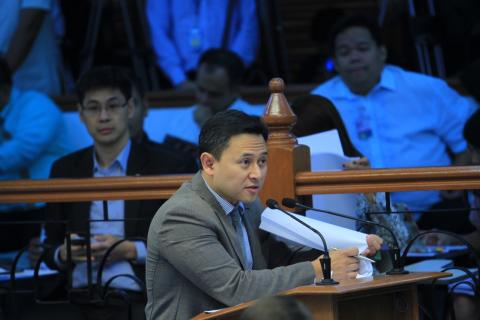
Senator Sonny Angara assured that tobacco farmers will continue to benefit from the incremental revenues from higher excise tax to be imposed on tobacco products starting next year.
Angara said the new tobacco excise tax bill approved by the Senate and the House of Representatives provides that up to 20 percent of the incremental revenues from the additional duties will go directly to 23 tobacco producing provinces to finance programs that will provide support for tobacco farmers and workers.
“Under the measure, 15 percent of excise tax on locally manufactured Virginia-type cigarettes but not exceeding P17 billion will go to Virginia tobacco producing provinces, while 5 percent but not exceeding P4 billion will be allocated to burley and native tobacco producing provinces,” Angara pointed out.
Angara said the support for tobacco farmers can be in the form of inputs, trainings, safety nets, infrastructure, livelihood and agri-industrial projects.
According to the National Tobacco Administration, at least three tobacco types are grown in 23 tobacco producing provinces in the Philippines. Virginia tobacco is grown in Ilocos Norte, Ilocos Sur, Abra and La Union.
Burley tobacco is grown in Pangasinan, La Union, Abra, Isabela, Cagayan, Tarlac and Occidental Mindoro; while the native or dark tobacco is grown in Pangasinan, La Union, Cagayan, Isabela, Nueva Vizcaya, Quirino, Capiz, Iloilo, Cebu, Negros Oriental, Leyte, Zamboanga del Sur, Bukidnon, Misamis Oriental, North Cotabato and Maguindanao.
The new tobacco tax measure will raise the excise tax for every cigarette pack from P35 to P60 for the next 4 years.
The starting rate of P45 will be implemented in 2020, followed by a series of annual P5 increases until the rate reaches P60 in 2023. Thereafter, the rate automatically increases by 5 percent.
In resorting to gradual tax increase instead of an immediate P25 bump to the current rate, Angara said lawmakers did a delicate balancing act in considering a measure that will reconcile the competing interests of the government, health advocates, the cigarette industry and tobacco farmers.
Angara said the tobacco tax hike bill is an important legislation that would not only help reduce deaths and disabilities due to smoking, but also generate the much-needed revenues for the government’s universal health care program.
However, Angara said the impact of raising the excise tax on the livelihood of tobacco farmers must not also be ignored.
“Mahirap din naman po ang kalagayan ng mga kababayan nating tobacco farmers. Mula raw po nang ipinatupad ang sin tax law noong 2013, mahigit 20 milyong kilo ng tobacco ang ibinaba sa produksyon,” Angara said.
“Libu-libong magsasaka rin, kasama na ang kanilang pamilya at mga taong nakadepende sa tobacco farming, ang tinamaan ng paghina sa produksyon,” he added.
Angara said that Congress is providing up to 4 years of graduated excise tax increases so that more tobacco farmers can shift crops. #
